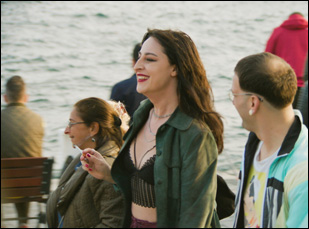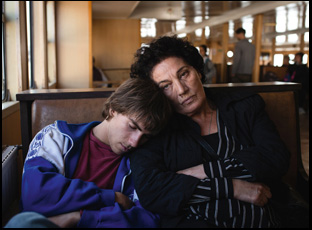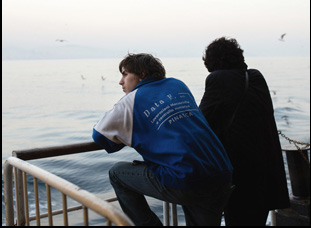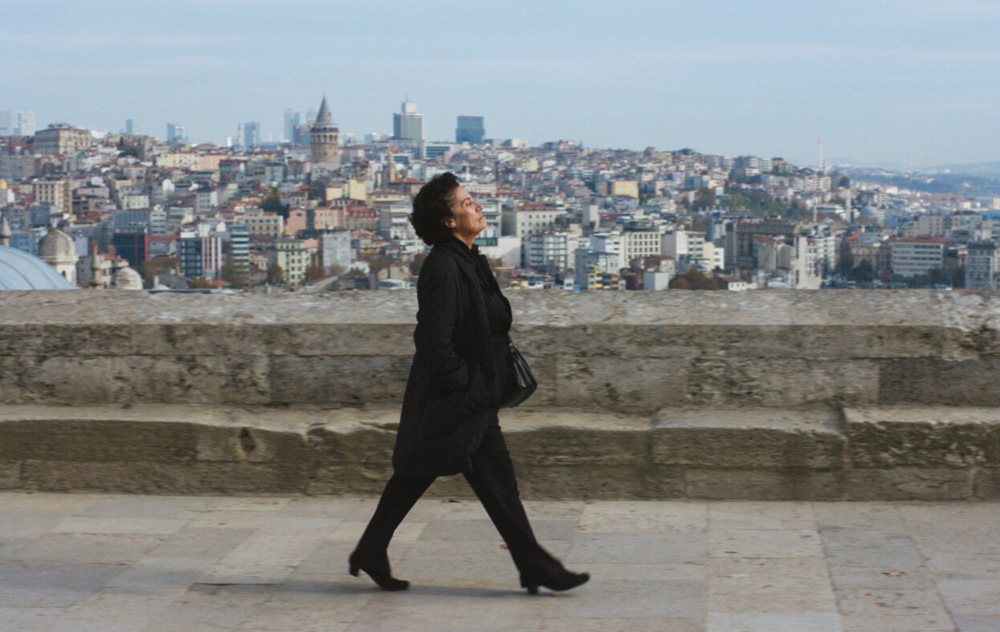Appropriately enough for a film where everything flows so seamlessly from one point to another, the idea for “Crossing” came to Levan Akin in the midst of putting together his breakout 2020 film “And Then We Danced,” researching the scourge of homophobia in Tbilisi, Georgia for the story of a dancer who comes to trust his instincts about what steps to take when a recent arrival in his company shows him possibilities he hadn’t imagined for himself in the conservative culture. Akin generally conducts a lot of interviews and he was especially moved to meet a grandfather who had a trans grandchild and loved them dearly, something that might’ve been hard for many native Georgians to imagine, but Akin, whose family with roots in the region moved to Sweden before he was born, could more clearly see as he crafts the story of the 70-year-old Lia (Mzia Arabuli), who in grieving the loss of her sister hopes not to lose touch with Tekla, her trans niece, who moved to Istanbul after the two had a falling out.
Acceptance doesn’t come immediately, nor does actually finding Tekla in the first place when Lia can’t speak Turkish and has to lean on what little of the lingo is known by Achi (Lucas Kankava), a twenty something who joins her on the ferry ride across the Black Sea after getting kicked out of his older brother’s place when finding a purpose in life – or more pressingly, a job – has eluded him. Yet while a search for Tekla takes them into the less respectable corners of Istanbul, both Lia and Achi, for as annoyed as they can make one another, start feeling more comfortable in the areas perceived as more dangerous by the locals when surrounded by the community that could make Tekla feel at home, ultimately finding their way to Evrim (Deniz Dumanli), a lawyer for an LGBTQ+ organization Pink Life, who can help guide them in their search.
It isn’t difficult to understand why the two start to let their guard down in Akin’s enchanting drama where the city comes alive around you as vividly as you see it does around Achi and Lia, who can’t help but dance in the street when music starts wafting through the air and any barriers that seem to have been imposed by language, nationality or cultural attitudes all seem to fall away in general as “Crossing” is revealed to be a beautiful story of belonging, if only in one’s own skin. After premiering earlier this year at Berlinale where it won the Teddy Award, the film is now arriving on U.S. shores, bound to leave audiences feeling much the same way Akin might’ve felt as a kid when his parents took him and his sister back to Istanbul in the summers as a place of great excitement and with “Crossing” opening for special theatrical engagements around the country before it starts to stream on MUBI, the director spoke about how his previous film laid the groundwork for this, its extraordinary fluid camerawork that gives it such a magical quality and all the life bursting at the seams of every frame.

This reaction to “And Then We Danced” in Georgia [where there was a] polarizing narrative that happened [where people were saying] “it’s the younger Georgian people against the bigoted older Soviet generation,” I felt like that narrative just served the oppressor. It was a very divisive narrative and it irritated me. I [thought], “That’s bullshit because it’s not that black and white, come on.” So that was very much the reason why I was like, I want to make a movie from the perspective of an older person who happens to be related to someone who’s LGBTQI+. This was before I’d decided on it being trans.
I was expecting to find out after the fact that Mzia was some kind of screen legend in Georgia that I had somehow been unaware of, but she really had only made a few films throughout the years. What was it like to find her for Lia?
It’s crazy. It was like finding a diamond in the [rough], I was like, “Jesus Christ, how is this woman on every Georgian movie? That face!” She was created for cinema.
Did you have a pretty specific idea for the character before she walked in?
I did, but Mzia added something else to that. I was looking, looking, looking, and I had so much trouble finding her. And then when I saw her the first time, I was like, “Whoa, who is she? And then I met her and I was like, it’s her. I knew that it was going to be an older woman, but in a super early version, she was older, like 89 or 90 and then I changed that to slightly younger at 70, and it’s very much an organic process.
Because I understand she was the only actor with professional experience, was that a dynamic that you can get excited about?
It’s not something that I think about too much. I never set out [saying] “I only want to work with non-actors” or vice versa. It’s very much something that happens practically. I always look also for professional actors, but especially in these types of films that are very location specific and very tricky to cast, I’m always going to cast real people inevitably.
Is it true you actually worked with the organization that’s referenced in the movie – Pink Life – to get a greater authenticity for this community?
Yeah, we started by contacting several NGOs in Turkey — Pink Life, Red Umbrella — and then I had meetings with them and just asked about the situation, just so I could get an overview. Then I met specific people there who helped me a lot with the research process and we hired people from the community on the film team, which was also very helpful to making the film.

That came from my research, too. Like the first location [in Georgia], the house by the water was something that we drove past, and I [thought], “Wow.” And then when I rewrote the beginning of the film, I wrote it specifically for that location, so it all flows together. And [in general], it was very much like, “Okay, I’m finding these places when I’m doing my research”and everything started coming together. And then it evolves, even while I was filming.
There’s such a beautiful scene in the movie that sets up all the characters so well in one long take as they ride a ferry on different floors and in one fluid shot, you move from stem to stern. How did that come about?
From very early on, I wanted the film’s visual language to feel very much like almost a third person following [the characters], really almost like it’s one of us viewing the film. So I thought wouldn’t it be interesting if the camera just starts meandering off on its own, looking at locations and finding spaces. Sometimes the camera is very close and almost locked on them and sometimes it’s more objective from a distance, [as if it’s] smoking a cigarette, looking at them.
The idea came from the camera being a third set of eyes in the film, and [in general] Istanbul feels like an advent calendar where you open little boxes and peek in and you see something and then you close it. It’s a very rich tapestry, and it is so transient. It was a different place now when we were there screening the film in the spring than it was when I was there filming two years before. It’s a space that’s always changing. Demographically, people from Eastern Anatolia move in to a neighborhood, and they live there for 10 years and then they start moving and then Syrian refugees take over or trans women, so it’s very, very alive.
That all comes across on screen, and in the film when you always seem to be right in the middle of the action, was there anything that happened that made it into the film that you couldn’t expect, but you like about it now?
All the cats. Like in the hospital, when the cat sits on her lap, that happened spontaneously. There was a lot of art by accident, courtesy of cats, which was lovely.
There was some behind-the-scenes footage you posted to your Instagram of a spontaneous song breaking out during the bakery scene and I got the sense that may just be the vibe on your movies.
Yeah, it is the vibe, but not just in my movies, but in Turkey and Georgia in general. People sing spontaneously. It sounds almost like a cliche, but it’s not. I was in several situations with people in my team where I would be humming something on my own and they were like, “Oh, that song…” or “Who is your script editor? She has an amazing voice” and then be like, “Can you sing for him?” Then they would just sing very earnestly and beautifully for like five minutes. We don’t really do that in Sweden. [laughs] How is it in America?

No, but that’s how they hang out. People sit and sing. Turkey is a very musical country. There’s always music. It’s never silent in Istanbul. There’s always like a street musician or someone playing next door.
It came together so beautifully and since you mentioned taking the film back to Turkey, what’s it been like to share this with other people so far?
It’s been very nice meeting the audience and having conversations with them. When “Dance” came out, there was a lockdown, so I was never able to really speak to audiences. I was getting messages and things like that, but never like this, so that felt very nice and it’s something that I really love. I wish I could do it more, but also I can’t go to all of the places, unfortunately, even though I really want to, so I’ve had to be more picky this time than the last because I could be traveling for two years straight, probably.
You’ve got the films that can travel.
Yeah, I’m happy about that.
“Crossing” opens on July 19th in New York at the Angelika Film Center and Los Angeles at the Laemmle Royal. It will open on July 26th in Milwaukee at the Oriental Theatre and go wider on August 2nd. A full list of theaters is here and it will begin streaming on Mubi on August 30th.




